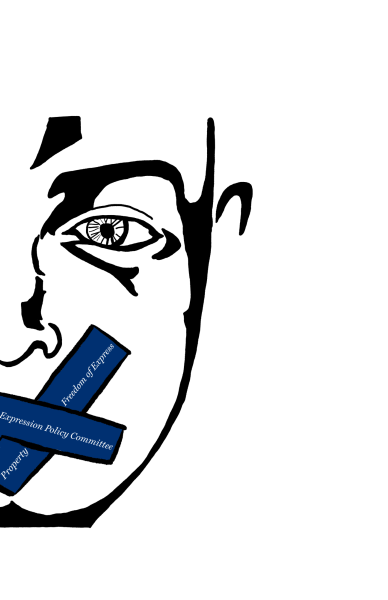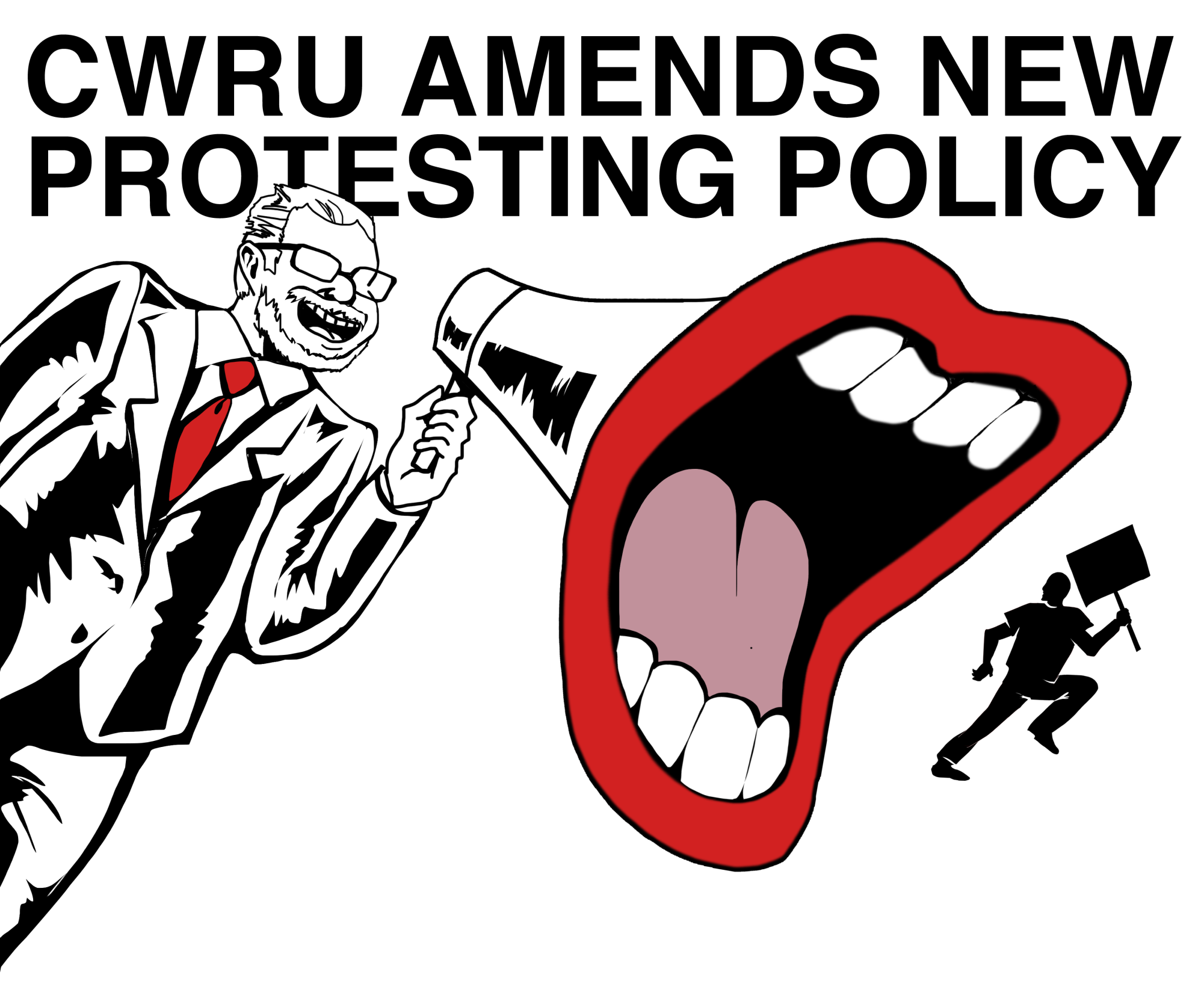On Aug. 6, Case Western Reserve University President Eric Kaler sent an email announcing new rules and regulations regarding protesting on CWRU’s campus. This email follows a trend of college campuses across the nation creating such regulations to moderate protests in the aftermath of the spring 2024 Gaza Solidarity Encampment on KSL Oval. A second email was sent to the community on Aug. 28 that revealed revisions to these initial rules.
“The intent of these procedures and operating rules is to enable demonstrations to occur while ensuring the safety of our community, equal access to educational resources and facilities for all, and continuing operations of our university,” a university spokesperson said.
The original Aug. 6 policy created strict requirements to protest on campus. This included a two-hour limit for all protests and one approved location: KSL Oval. It also explicitly prohibited many actions including usage of tents, megaphones and video projections which were all used by organizers last semester.
The largest change made by the initial regulations was the required approval of all protests by the Freedom of Expression Policy Committee, with notice required seven days before the demonstration’s start date.
The initial email from Kaler and Provost and Executive Vice President Joy K. Ward noted that these policies were developed “in consultation with faculty, staff and student leaders.” The original preamble said that it was reviewed by the Undergraduate Student Government (USG). According to USG President, fourth-year Amman Spencer, he, nor the rest of his organization, reviewed the rules before their publishing.
“We had not seen it before it came out,” said Spencer, where he mentioned that he only learned about the rules at the same time as the rest of the university. He also said that previous USG administrations were unaware of these rules.
Third-year Zelene Desiré, the vice president of student life for USG, added further context: “Amman and I had one brief meeting with George O’Connell, the Director of Student Conduct and Community Standards, and Travis Apgar, the new Vice President of Student Affairs, to review the Student Code of Conduct on July 30. We both had major criticisms of the changes but left the meeting satisfied that the administration invited us to speak about university policy.”
Similarly, the President of the Undergraduate Diversity Collaborative (UDC) third-year Sofia Castro noted in an email to The Observer that “UDC was not consulted on anything regarding the new protest regulations.”
USG and UDC were two of the three umbrella organizations that met with President Kaler during the encampment, resulting in an email from then-USG President Basil Yaseen claiming that the administration misled the leaders during their initial conversations.
When the policy was released in August, many reactions were swift. The CWRU chapter of the Ohio Student Association painted the Spirit Wall outside of Thwing Center with the text “Protest is Free Speech.”
In response to the new rules, CWRU’s chapter of Students for Justice in Palestine gave written remarks to The Observer. They said, “The new protest policies put in place by CWRU administration are entirely authoritarian in nature. Every student at CWRU should reject this imposition upon our basic right of protest. It is our duty as students to engage in academic and political discourse to challenge the status quo.”

The largest reaction from the faculty came from those teaching at the CWRU School of Law where “A Resolution of Concern” was passed unanimously. In the document, they argued that the new policy is “inconsistent with the stated free expression policy” and legal precedent, and at the same time it could jeopardize the American Bar Association’s accreditation of the law school.
“The rights guaranteed in the Trustee-approved freedom of expression policy remain subject to university permission–in other words, they are not rights at all,” reads the resolution.
Law school faculty also noted that the document was never presented to the Faculty Senate. Janet McGrath, chair of the Faculty Senate and the Department of Anthropology, wrote in a comment to The Observer, “the Faculty Senate will be reviewing these procedures this semester. We have not convened yet, however, so that process has not officially started. The Faculty Senate leadership was consulted over the summer, but the Faculty Senate will take up the matter this semester. Our first meeting is later this month.”
The administration, on the other hand, defended their new rules: “Following experiences across our campus in the past five years, including protests and encampments in spring 2024, we knew it would benefit our community to clearly define guidelines surrounding the implementation of this policy. This ensures all members of the community, including university leaders, understand expectations and have clear parameters for what aligns with the policy. Having these procedures and operating rules in place will help ensure the freedom of expression for all members of our community, as well as a safe, equitable and welcoming environment across our campus.”
Once the policy was released, Spencer recalled that “a lot of students [were] reaching out to me over text, asking what was going on … I went back and I had conversations with the administration … and I said I’d love to give student feedback, and they were open to it on the first version.”
When asked why the regulations were adjusted on Aug. 28, a university spokesperson said that “Faculty, staff and students highlighted a range of areas where enhancements could be made to provide more flexibility while still ensuring the safety of our community, equal access to resources and facilities, and maintenance of ongoing operations. A few of the most prominent changes were specifically noted in the email to campus.”
USG was privy to these new regulations in a meeting on Aug. 27 where staff from the Division of Student Affairs, The Office of General Counsel and The Office of the President met with USG’s Executive Committee to propose changes to the rules.
According to the meeting minutes, USG pressed the staff on various points of the amended policy. One of the first issues brought up was the existence of a time limit, which Chief of Staff Katie Brancato noted is “for planning and staffing purposes.” But she also mentioned student feedback “that two hours are very short, I think the feedback came from students that you are in classes so you may miss an event because you want to go to a demonstration but have class, so that’s why we made it longer.”
Apgar noted in the USG meeting that “We can’t allow anything that prevents access to educational activities. Everyone on the campus has the right to access campus buildings. We’ll work to make sure that happens.”
Another point that USG questioned was the prohibition of wearing a mask to avoid identification. Brancato explained, “Culturally if someone’s covering their face, it’s usually pretty obvious that that’s the case. If we show up and everyone has a mask on because they don’t want to be seen, then we might have to say, ‘if you have health reasons, fine,’ but for the safety of the situation, we want people to not cover their face.”
The university spokesperson stressed that the creation of the rules was a collaborative process: “In addition to the Freedom of Expression Policy Committee members, we also consulted with student government, Staff Advisory Council and Faculty Senate leaders, as well as individuals from across campus.”
This new policy distinguishes between a small protest—one with 20 or fewer people that takes under two hours—and a larger protest. The former does not need pre-approval from the committee.
Large protests are allowed to last for five hours in three more outdoor locations besides KSL Oval, and the approval form only needs to be submitted three days prior to the event. The new policies also allow for non-university affiliated members to speak at large protests only with prior approval.
The main approval body for all of these steps is the Freedom of Expression Policy Committee. CWRU’s Policy on Freedom of Expression/Expressive Activities allows the school to “reasonably regulate the time, place, and manner of expression to ensure that it does not disrupt the ordinary activities of the University.”
“Case Western Reserve is committed to ensuring the free exchange of ideas and the dialogue and demonstrations that may accompany such freedoms. Since 2019, Case Western Reserve has had a freedom of expression policy, which notes the university’s ability—as all private entities have—to regulate the time, place and manner of demonstrations to ensure the safety of our community and equal access to facilities and educational opportunities,” noted the university spokesperson.
In the USG meeting, General Counsel Peter Poulos stressed that “the committee is designed to allow students to demonstrate. In fact, in the [five plus] years that this policy has existed, there wasn’t a demonstration requested that we said no to, as the expectation and goal is that we will never get to a no for the next five years.”
Brancato noted that the committee itself meets weekly. She said, “It will meet more often because we are committed to responding to people who request demonstrations within 24 hours.”
Faculty have one seat on the committee, reserved for the chair and vice chair of the Faculty Senate, and current students do not have any spots. This means that 18 of the 19 spots are staffed with administrators and professional staff members.
This was a topic that USG leaders pushed back against. Apgar noted that student voices were expressed because “there are two representatives of student affairs as it’s literally in our job description to advocate for students.”
When pressed, Apgar said, “We typically want to do everything we can to have student input, but when it applies to applying our rules and policies and governing the university, that’s our job.”



